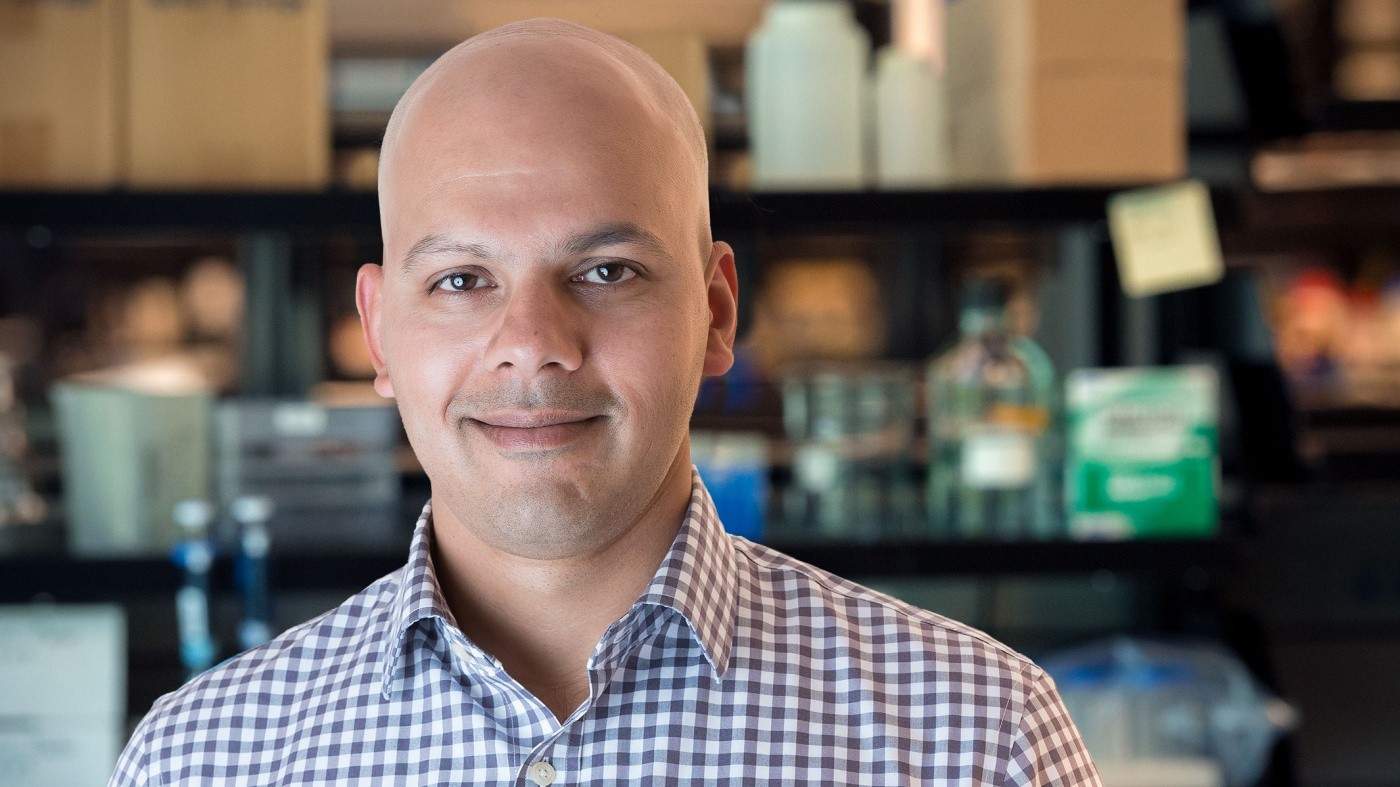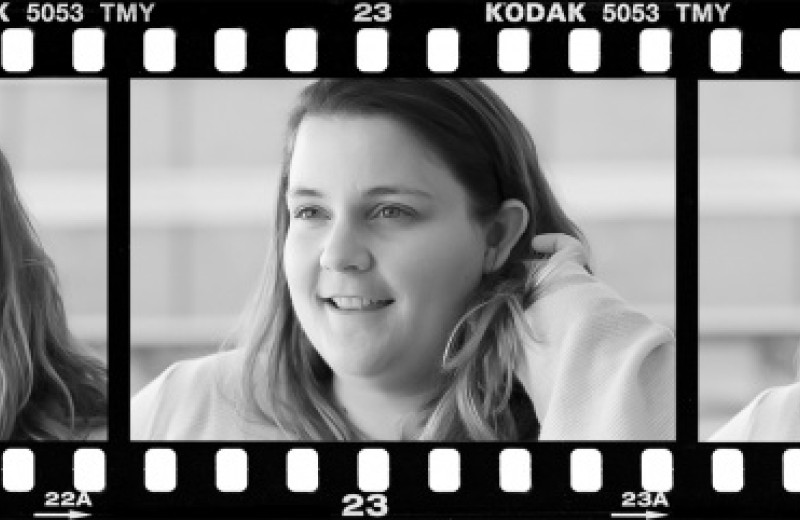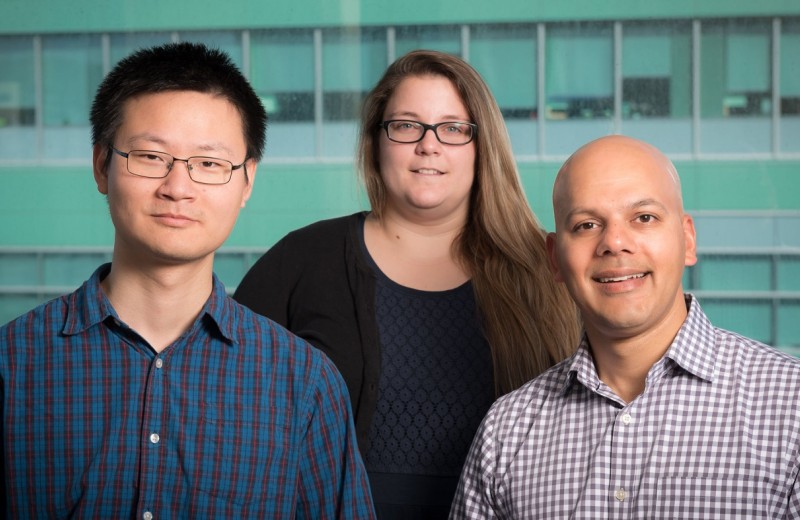Gladstone NOW: The Campaign Join Us on the Journey✕

Taking inspiration from cancer research, Gladstone associate investigator and adult cardiologist Saptarsi Haldar, MD, investigates how to fix harmful gene expression in damaged heart cells. [Photo: Chris Goodfellow, Gladstone Institutes]
For people with heart failure, the prospects for a long and active life are limited. Most will be unable to jog or climb stairs without getting dangerously short of breath or even risking sudden death. Current drugs work at the surface of heart muscle cells to block stress hormones, such as adrenaline, that are produced when the heart is injured. However, despite widespread use of these therapies, a staggering 40 percent of heart failure patients will die within 5 years of diagnosis.
Fortunately, there is new hope in the fight against heart failure. Taking unexpected inspiration from cancer research, Gladstone’s newest associate investigator, adult cardiologist Saptarsi Haldar, MD, studies a class of drugs that may treat heart failure closer to the source of the problem.
How Is Heart Failure Like Cancer?
At the root, both cancer and heart failure are driven by changes to cells’ DNA. Every cell in a person’s body has the same set of DNA, but what dictates whether a cell is a heart cell or a brain cell—or a healthy cell or a diseased cell—is which genes are turned on or off. The genes that are switched on, or “expressed,” cause the cell to produce proteins and behave in certain ways.
In cancer, mutations occur in a cell’s DNA sequence that alter gene expression and cause uncontrolled cell growth. These mutations may arise from behavioral and environmental risk factors, such as smoking, consumption of red meat, or exposure to sunshine. Mutations also may be inherited, such as those in the BRCA gene, which increases a person’s risk for some types of cancer.
In contrast, the majority of heart failure in adults is not typically caused by mutations in the DNA sequence. Rather, damage or stress to the heart muscle changes how the DNA is packaged, which, in turn, affects gene expression in the cells. These changes result in a heart that becomes enlarged, inflamed, and full of scar tissue, and that cannot pump enough blood to the body. Over time, the heart continues to deteriorate in a vicious cycle that culminates in extremely poor quality of life, frequent hospitalization, and early death.
Could a Cancer Drug Treat Heart Failure?
Available drugs work at the surface of heart cells, defending them from additional damage by dampening external stressors, such as the hormone adrenaline. In contrast, Haldar’s approach goes to the root of the problem and blocks destructive processes in the cell’s command center, or nucleus, to alter the expression of harmful genes.
He has been studying a new class of drugs that have shown great promise in the cancer arena. The prototype drug, JQ1, blocks a protein called BRD4 that turns on genes that cause disease, particularly in cancer cells. Haldar had a hunch that BRD4 might also control genes that cause heart failure, and that the new cancer drug might stop or even reverse the damaging effects of stress on the heart. He was right.
In a series of experiments, Haldar discovered that JQ1 stops the harmful gene expression that enlarges the heart and damages heart cells. When he injected JQ1 into mice with heart failure, the mice dramatically improved, suggesting that the drug may help heal injured hearts.
“If you’d asked me three or four years ago whether we could manipulate cardiac genes in this way, I would have said that the heart wouldn’t be able to tolerate it,” said Haldar. “But, it turns out, if you choose the right protein and target it in just the right way, you can really improve the function of a sick and failing heart.”
Are There Other Targets?
Since his initial discovery, Haldar has continued to test the ability of JQ1 to treat heart failure. In addition, he has also discovered another protein that can be affected by drugs and directly influences gene expression in both cancer and heart failure.
“Our discovery of a second protein indicates that drugging the system that regulates gene expression may be a more general strategy to treat heart failure,” explained Haldar. “Our work also supports the principle that some of the same things that drive cancer can be targeted to treat heart failure.”
So far, JQ1 has been relatively well tolerated in both preclinical studies and in early phase clinical trials for cancer patients. Progress in the cancer clinical trials in tandem with Haldar’s cardiovascular research at Gladstone will advance efforts to use the drug to treat patients with heart failure. If successful, it will provide a new weapon to fight this all too common and lethal disease.
Meet Gladstone: Saptarsi Haldar
Meet Gladstone: Saptarsi Haldar
Saptarsi chats about the growth of his lab over the past 2 years, his love of soccer, and his hidden musical talents.
Profile Haldar LabProfile: Sarah McMahon
Profile: Sarah McMahon
Sarah shares how summers spent by the ocean piqued her interest in science.
Haldar LabCancer-Cardiac Connection Illuminates Promising New Drug for Heart Failure
Cancer-Cardiac Connection Illuminates Promising New Drug for Heart Failure
Gladstone scientists show that a cancer drug is effective in treating common causes of heart failure
Haldar Lab Srivastava Lab Stem Cells/iPSCs Heart Failure



